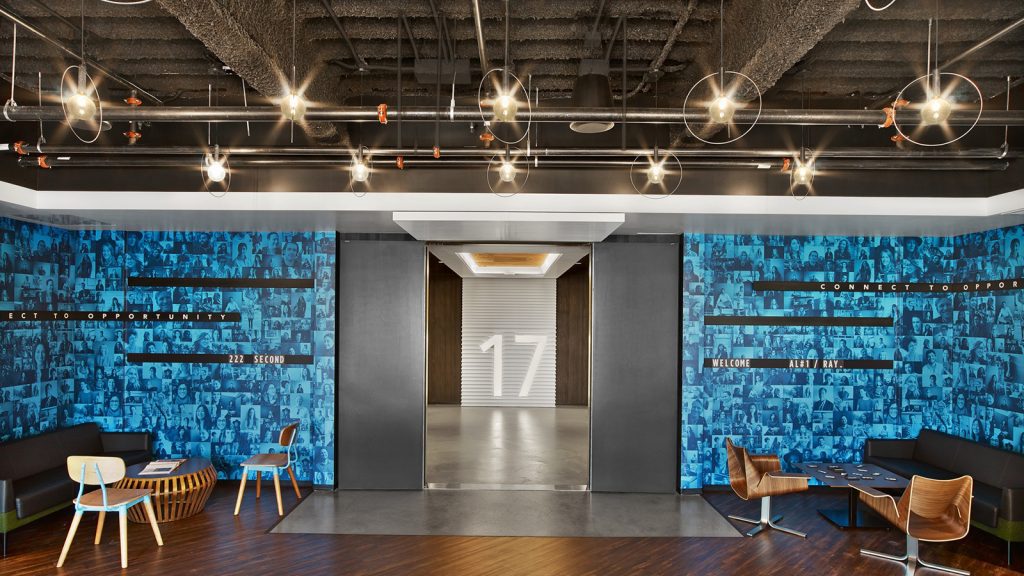Interview with John Gilligan: The New Director of the Oxford Saïd Finance Lab

Are you looking to dive deep into finance during your MBA program with the opportunity to interact with banking firms, funds, and industry leaders? That’s the theory behind the Finance Lab at the University of Oxford’s Saïd Business School. Continue reading…
Choosing the Best MBA: Philadelphia vs. Washington DC

On the surface, cities like Philadelphia and Washington DC appear to have a lot in common. Both have occupied roles as a center of U.S. history, and have transformed into exciting and ever-changing metros for both established businesses and new startups. If you’re interested in earning an MBA in a top metro area on the East Coast, it might seem impossible to choose between the two.
Even so, Philadelphia and DC offer a number of exciting—but different—kinds of opportunities for up-and-coming business professionals. Between what program you want to pursue and what kind of career you envision yourself in down the line, understanding the differences between top metros can be a crucial part of planning your future. Below, we’ll break down some of the biggest differences in location, programs, and job placement for each metro.
Philadelphia vs. Washington DC: The Differences
For ambitious business students hoping to put their education to work in a government agency, it’ll be hard to beat the nation’s capital for opportunities and experience. Even for those looking outside of the government setting, the DC metro area is home to fifteen companies on the Fortune 500 list, including corporate giants like Exxon Mobile and Walmart. Yet while such heavy hitting companies in the area provide a high earning potential, MBAs will still want to consider the high price of living in DC: currently, the city ranks as the third most expensive place to live in the country.
Check This Out: Searching for the World’s Top MBA Recruiters: Comcast
While Philadelphia may not be the city that pops into your mind as a bustling center of business, research shows the City of Brotherly Love can’t be beat when considering the job market and affordability: a 2016 survey from Adobo found that Philadelphia’s unemployment rate was 20 basis points below the national average, while the average price of a home was at or below 30 percent of the average income. MBA graduates will find no shortage of business opportunities in the city, even among major firms: in 2017, 20 companies in the Philadelphia metro made the Fortune 500 list.
Washington DC’s Full-Time MBA Programs
Featuring more than 35 higher education institutions with post-bachelor business programs, Washington DC is home to some of the top MBA programs in the United States. Fully aware that many of these programs will shape future politicians and government leaders, many of the MBA programs in Washington DC include a focus on integrity and ethics within the global business community.
Full-Time MBA Programs in DC Include:
- George Mason University School of Business
- George Washington University School of Business
- Kogod School of Business – American University
- University of Maryland R.H. Smith School of Business
- McDonough School of Business – Georgetown University
Philadelphia’s Full-Time MBA Programs
When it comes to business schools, Philadelphia is probably best known for The Wharton School at the University of Pennsylvania, consistently named as one of the top business programs in the world. But Philly is also home to a wide range of programs with a variety of specializations. Programs like the full-time MBA at Temple University’s Fox School of Business also offer students to take their education beyond Philadelphia, with international campuses based in Italy, London, and Japan.
Full-Time MBA Programs in Philadelphia Include:
- La Salle University
- LeBow College of Business – Drexel University
- Villanova School of Business
- West Chester University
Cost of MBA Programs
Just as important a factor as cost of living, average cost for an MBA program is an important consideration when choosing where to earn your degree. As expected, top programs in both Philadelphia and Washington DC can come with a high price tag. The average cost estimate for one year at Wharton is $105,265, while tuition at DC’s Georgetown McDonough School of Business is $90,591. The average for each city, however, remains much for affordable: approximately $82,090 for programs in Washington DC, and slightly lower in Philadelphia—schools like West Chester even offer an MBA as low as $21,000 per year.
Job Placement and Salary
With so many incredible companies located in both Washington DC and Philadelphia, MBAs have the chance to earn top salaries that can go a long way in both cities. Depending on the position, MBAs in Philadelphia can make anywhere from $64,665 per year (as a financial analyst) to $104,186 per year (as a senior product manager). In Washington DC, the average salary for an MBA graduate is in the $80,000 range, with employees reporting yearly salaries of $74,758 (operations manager) up to $111,983 (marketing director).
Why More and More MBAs are Coming to LinkedIn: #LinkedInLife

Since its 2003 launch, LinkedIn has been shaping the way people find jobs, becoming the most extensive professional social network on the planet. With over 530 million users, it is clear how the platform could pair job seekers with a multitude of career prospects. LinkedIn was just voted Company of the Year by HRDive for the comprehensive recruitment resources it offers its users. However, a network this expansive presents its own pool of opportunities. In fact, Glassdoor dubbed LinkedIn one of the 25 best places to work in 2017. For a company that prides itself on such a unique work environment, its employees even have their own hashtag (#linkedinlife). The company’s rising importance as a recruiting tool in the global economy (hence, over 30 offices worldwide) and its award-winning work environment make a career at LinkedIn an excellent option for MBA grads.
#LinkedInlife
LinkedIn takes a values-centered approach to building its employee culture. According to the company’s website, the values that define LinkedIn are: integrity, humor, transformation, collaboration, and results. Employees are entitled to a multitude of benefits, including 401(k) and Roth contributions, paid parental leave, 17 paid holidays, and an employee stock purchase plan (ESPP). The company also demonstrates its commitment to inclusive strategies by providing back-up childcare resources for employees whose children have special needs.
The Human Rights Campaign designated LinkedIn as one of the best places to work for LGBT equality in 2017. LinkedIn makes an effort to provide resources for its community’s LGBT members, including (but far from limited to) supporting gender reassignment surgery and ensuring that domestic partners and same sex spouses are included in U.S. Benefit programs.
In addition to a unique and inclusive set of standards and values, LinkedIn provides an environment that is far more exciting than that of the standard corporate job. According to The Undercover Recruiter, each floor of LinkedIn’s London office is structured according to a theme. The sports-themed floor has a Wimbledon Room with astroturf on the walls and an umpire chair.

Inside LinkedIn’s San Francisco headquarters/Photo by Eric Laignel.
Getting Hired
In recent years, LinkedIn has trended toward using its website and platform, as well as hosting regional events for recruiting as opposed to using traditional job fair settings. MBAs at LinkedIn can find jobs in sales, marketing, finance, product, and business development through the Student Careers program. At LinkedIn, the community is organized into teams, and each team has its area of focus. Professionals seeking careers specifically in business can choose from about fifteen possible teams. The Corporate Development and Strategy team, for example, leads the way in determining company strategy and analyzing market activity and opportunities. The Global Solutions team focuses on marketing, hiring, and sales. Those who wish to focus exclusively on marketing can look into the LinkedIn Marketing Solutions (LMS) team.
In a 2015 interview with Cosmopolitan, LinkedIn Global Talent Acquisitions Leader Tey Scott discussed how, despite its headquarters being located in Mountainview, CA, the company hires talent from everywhere—which can mean a lot for both domestic and international MBAs.
“We hire from around the world, and we have an amazing relocation assistance program that supports all levels of hires,” she says. “We offer temporary housing, and help employees find daycare, schools, or other things that suit their needs—whether it’s a student relocating from [the East Coast] to Silicon Valley, or someone who has to relocate an entire family and sell a house.”
Scott continues, saying, “We also try to help people get to know the new area they’re moving to. For recent graduates and students, we’ll put them in a LinkedIn group and start conversations with them so they can figure out what neighborhoods they want to live in, and even help them find roommates.”
The company has also made an active effort to convert interns into full-time employees, she adds. “The goal is to convert as many people who come through it into full-time employees. We have interns in all of our locations globally, and we even host interns from other Bay Area tech companies for an annual intern hack day at our headquarters. Undergraduate and MBA interns must be enrolled full-time in a program and return to the program following the internship.”
Find out more about LinkedIn’s MBA internship opportunities here.
The Premiere International MBA is Waiting For You in London

“London doesn’t love the latent or the lurking, has neither time, nor taste, nor sense for anything less discernible than the red flag in front of the steam-roller. It wants cash over the counter and letters ten feet high.” – Henry James
It could be argued that London is the quintessential—or at least the original—international destination. Both defiantly English and seamlessly accommodating for an international community, London is a city in a state of constant reinvention.
Oscar Wilde once said London was composed of “beautiful idiots and brilliant lunatics,” which makes perfect sense that the city is presently and almost always the world’s global financial center (close but no cigar, Singapore). It’s no secret that the city leads the charge when it comes to gold, silver, derivatives, foreign exchange, money markets, debt securities, and international insurance. And London’s strategic location means it can stay connected to both the East and West at all times.
These reasons and so much more make London perhaps the definitive choice for b-schoolers who aspire to cut deals that bridge cultures and cross borders. For prospective MBAs with international ambitions, opportunities to interface with every conceivable industry abound in London, as do opportunities to collaborate with non-UK companies with London hubs.
We took the liberty of giving you the skinny on four London-area business degrees that will set you on a global path. Let’s take a deeper dive, shall we?
London Business School
The London Business School EMBA-Global Americas & Europe degree is a multinational collaboration that imparts the “insight, network and international perspectives” that today’s globally focused executive needs. The program—a partnership between LBS, Columbia, and the University of Hong Kong—is available in two distinct paths for entrepreneurs, managers, or executives. EMBA-Global Americas & Europe students earn two MBAs as they study in New York and London, while EMBA-Global Asia students bridge the gap between East and West as they study in Shanghai, Hong Kong, New York, and London. Forbes ranked LBS’ international degree first overall in terms of its return on investment, as its 2012 class earned average salaries of $119,100 and paid back their investment in 3.4 years.
Imperial College London
The ICL’s Global Online MBA is a two-year, part-time degree that combines “innovative thinking and insight with new technology to develop practical solutions to real world issues, benefiting business and improving society.” The Global MBA is structured to maximize intimacy and in-class time, culminating in a week-long Capstone Business Game project.
CHECK THIS OUT: Oxford Saïd Dean, Together with Apple’s Tim Cook, Launches New Entrepreneurial Hub
Oxford University Saïd Business School
The Saïd Business School 13-month masters-level Global Business Diploma is focused on giving graduates the tools to “undertake the senior international responsibilities which drive organizational success.” Director Kathy Harvey explains that the degree is guaranteed to “provide insights to anyone operating, or aspiring to operate, in a global environment.” Graduates will have an advanced “understanding of the issues involved in conducting business in a global landscape,” particularly “global business strategy, risk and reputation, corporate diplomacy and doing business in emerging economies.”
Cambridge University’s Judge Business School
The Judge Business School at Cambridge University Global Business concentration emphasizes cross-cultural differences; doing business in/with emerging economies; managing the multinational enterprise; and multinational organizations in social and environmental issues. The concentration was developed specifically for MBA students “seeking careers in careers at multinational organizations; small and medium-sized enterprises in sectors that are affected by international pressures; and students with a general interest in the role of organizations in global issues.”
Beyond Business School: Meet the Cambridge EMBA Who Is Rebuilding Libya

As an Executive MBA (EMBA) student, you don’t have to choose between your career and your studies, which was exactly the case for Roland Friedrich, who worked as a senior political affairs officer for the United Nations while pursuing his EMBA at Cambridge Judge Business School. Friedrich graduated with his EMBA in 2016, but through his studies he was involved in the rebuilding of Libya as part of the United Nations Support Mission in Libya (UNSMIL). This mission, established in 2011, supports the country’s transitional authorities and institutions after the overthrow of Colonel Gaddafi.
Of his role, Friedrich said in a Cambridge Judge blog: “42 years of authoritarian rule left behind weak institutions, multiple factions, and militias vying for influence and an abundance of weapons. Six years after the 2011 revolution, the country faces a prolonged political, security and—more recently—economic crisis. The challenges range from terrorism and organized crime and deteriorating living conditions to political polarization and fragmenting institutions.”
As for how he got involved in Libya, it started with a career in the German armed forces where he focused on conflict management, security sector reform, and Middle Eastern affairs. From there, Friedrich spent eight years at the Geneva Centre for the Democratic Control of Armed Forces as a security sector reform advisor. After that, he joined the UN to work directly with Libya.
Over the course of his work, Friedrich has been involved in some incredible initiatives, including ceasefire negotiations between the ‘Libya Dawn’ and ‘Dignity’ militias, negotiating the Libyan Political Agreement, and advising the Special Representative of the UN Secretary-General for Libya on the mission’s policies in the region.

Friedrich (EMBA ’16) pictured third from left. Image via Cambridge Judge website.
“[This work] requires a thorough understanding of the local players and their motivations, a clear vision of what you want to achieve, and lots of creativity and flexibility when facilitating a deal,” he wrote. “There are quite some shared aspects here with strategy development and negotiations in the business world.”
And it was these “shared aspects” that made an EMBA at Cambridge Judge such a good idea. In his work, particularly dealing with the balance of power between nations, Friedrich found that understanding the latest management approaches was a great way to enhance his work in mediation and strategy.
“Cooperation between the UN and the private sector is picking up sharply, not only in the humanitarian and development fields but also in peace and security,” Friedrich explained. “The EMBA helps me get on top of the latest management concepts and practices. It also helps me develop a thorough understanding of strategic management and organizational behavior—issues that have always fascinated me and that are of direct relevance to my work.”
For a full account Roland Friedrich’s experience as a UN officer and EMBA student, check out the blog on the school website.
This article has been edited and republished with permissions from Clear Admit.
George Mason School of Business Welcomes New Dean Maury Peiperl

Maury Peiperl, Dean of the George Mason University School of Business since August, is quickly learning and already taking real steps to transform the institution.
